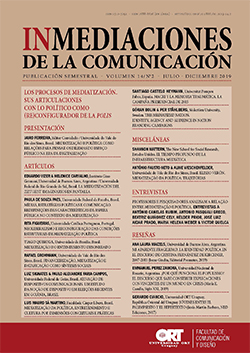Teachers and researchers analyze the relationship between mediatization and politics
DOI:
https://doi.org/10.18861/ic.2019.14.2.2929Abstract
EXPLANATORY NOTE
The relations between mediatization processes and the functioning of political practices are at the center of the concerns of academic research in different geo-academical contexts, as can be seen in the reflections developed by researchers and university professors from different
countries: Brazil (Antônio Albino Canelas Rubim, José Luiz Aidar Prado, Maria Helena Weber), Venezuela (Antonio Pasquali), Colombia (Beatriz Quiñonez Cely), Portugal (Helder Prior) and Bolivia (Víctor Quelca). The considerations of these thinkers, presented in the dossier,
are published here in the form of interviews.
The authors point out several issues, such as the relationship between intellectuals and the media, by recollecting that there can be no intellectuals if there are no media predisposed to promote the public debate on the main concerns democracy undergoes. They analyze communicational strategies by highlighting the evidence of continuities between practices developed by ideologically different governments around symbolic ways of seeing the world. They also denounce the fact that the informational galaxy is today being pathologically contaminated, on a large scale, by the manipulation of the informational processes, leaving
receivers without credible referents. They consider that communicational studies resent a greater connection with social movements and communication policies, like the fact that we live a “conservative wave”, does not mean that the population becomes more conservative.
They reflect on the functioning of political discourses by emphasizing that they circulate relying on cognitive dimensions, but also resorting to the order of the sensitive, by appealing to feelings and emotions. They attribute to television and to marketing determinism strong responsibilities concerning the end of democracy when they point out that politics has submitted itself to the polls since the future depends on opinion. They also reflect on voter empowerment, which depends not only on other factors already described but on the dynamics organized on social networks as well as on the articulations of the “bubbles” in which the individuals are insulated.





